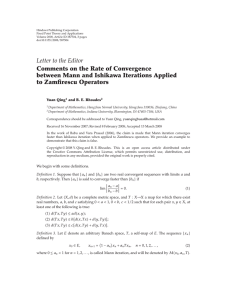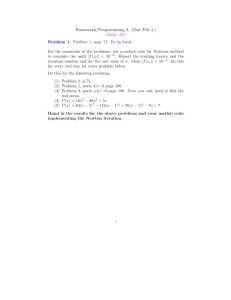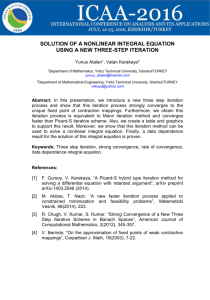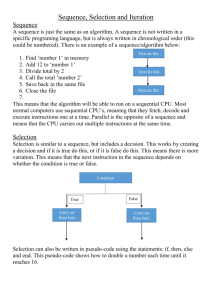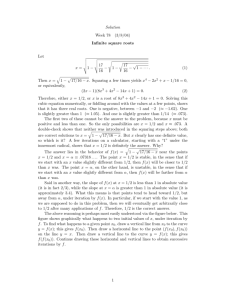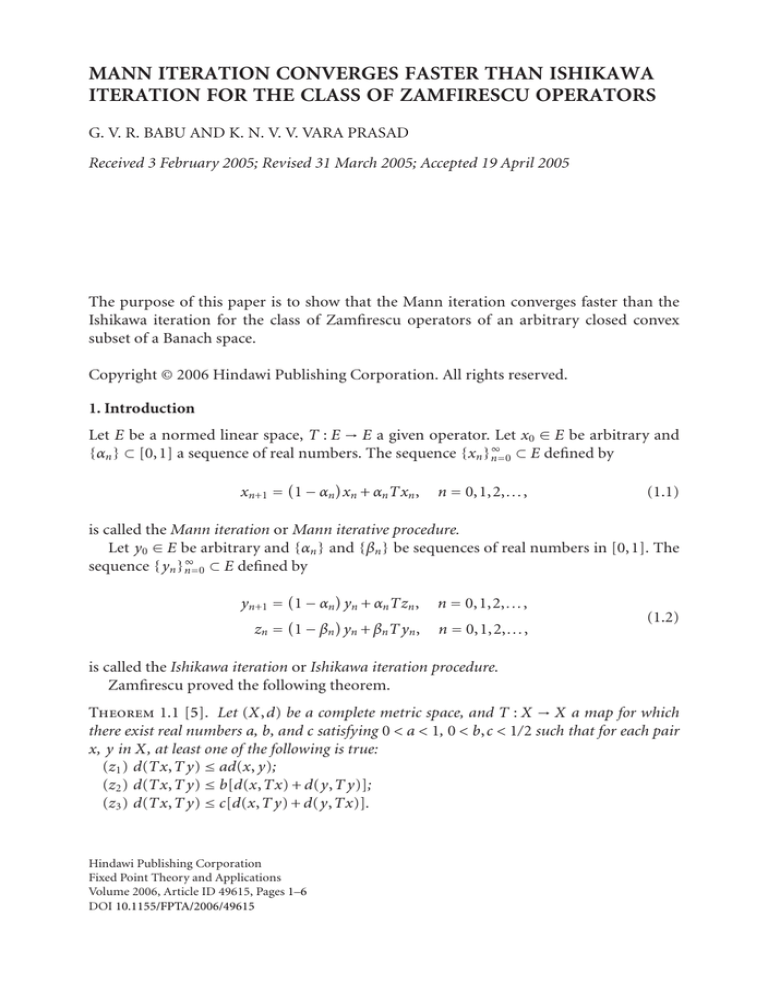
MANN ITERATION CONVERGES FASTER THAN ISHIKAWA
ITERATION FOR THE CLASS OF ZAMFIRESCU OPERATORS
G. V. R. BABU AND K. N. V. V. VARA PRASAD
Received 3 February 2005; Revised 31 March 2005; Accepted 19 April 2005
The purpose of this paper is to show that the Mann iteration converges faster than the
Ishikawa iteration for the class of Zamfirescu operators of an arbitrary closed convex
subset of a Banach space.
Copyright © 2006 Hindawi Publishing Corporation. All rights reserved.
1. Introduction
Let E be a normed linear space, T : E → E a given operator. Let x0 ∈ E be arbitrary and
{αn } ⊂ [0,1] a sequence of real numbers. The sequence {xn }∞
n=0 ⊂ E defined by
xn+1 = 1 − αn xn + αn Txn ,
n = 0,1,2,...,
(1.1)
is called the Mann iteration or Mann iterative procedure.
Let y0 ∈ E be arbitrary and {αn } and {βn } be sequences of real numbers in [0,1]. The
sequence { yn }∞
n=0 ⊂ E defined by
yn+1 = 1 − αn yn + αn Tzn ,
n = 0,1,2,...,
zn = 1 − βn yn + βn T yn ,
n = 0,1,2,...,
(1.2)
is called the Ishikawa iteration or Ishikawa iteration procedure.
Zamfirescu proved the following theorem.
Theorem 1.1 [5]. Let (X,d) be a complete metric space, and T : X → X a map for which
there exist real numbers a, b, and c satisfying 0 < a < 1, 0 < b,c < 1/2 such that for each pair
x, y in X, at least one of the following is true:
(z1 ) d(Tx,T y) ≤ ad(x, y);
(z2 ) d(Tx,T y) ≤ b[d(x,Tx) + d(y,T y)];
(z3 ) d(Tx,T y) ≤ c[d(x,T y) + d(y,Tx)].
Hindawi Publishing Corporation
Fixed Point Theory and Applications
Volume 2006, Article ID 49615, Pages 1–6
DOI 10.1155/FPTA/2006/49615
2
Mann iteration converges faster ...
Then T has a unique fixed point p and the Picard iteration {xn }∞
n=0 defined by
xn+1 = Txn ,
n = 0,1,2,...,
(1.3)
converges to p, for any x0 ∈ X.
An operator T which satisfies the contraction conditions (z1 )–(z3 ) of Theorem 1.1 will
be called a Zamfirescu operator [2].
∞
Definition 1.2 [3]. Let {an }∞
n=0 , {bn }n=0 be two sequences of real numbers that converge
to a and b, respectively, and assume that there exists
an − a .
l = lim n→∞ bn − b
(1.4)
∞
If l = 0, then we say that {an }∞
n=0 converges faster to a than {bn }n=0 to b.
Definition 1.3 [3]. Suppose that for two fixed point iteration procedures {un }∞
n=0 and
{vn }∞
both
converging
to
the
same
fixed
point
p
with
the
error
estimates
n =0
u n − p ≤ an ,
vn − p ≤ bn ,
n = 0,1,2,...,
n = 0,1,2,...,
(1.5)
∞
where {an }∞
n=0 and {bn }n=0 are two sequences of positive numbers (converging to zero).
∞
∞
If {an }n=0 converges faster than {bn }∞
n=0 , then we say that {un }n=0 converges faster than
∞
{vn }n=0 to p.
We use Definition 1.3 to prove our main results.
Based on Definition 1.3, Berinde [3] compared the Picard and Mann iterations of the
class of Zamfirescu operators defined on a closed convex subset of a uniformly convex
Banach space and concluded that the Picard iteration always converges faster than the
Mann iteration, and these were observed empirically on some numerical tests in [1]. In
fact, the uniform convexity of the space is not necessary to prove this conclusion, and
hence the following theorem [3, Theorem 4] is established in arbitrary Banach spaces.
Theorem 1.4 [3]. Let E be an arbitrary Banach space, K a closed convex subset of E, and T :
K → K be a Zamfirescu operator. Let {xn }∞
n=0 be defined by (1.1) and x0 ∈ K, with {αn } ⊂
[0,1] satisfying
(i) α0 = 1,
(ii) 0 ≤ αn < 1 for n ≥ 1,
(iii) Σ∞
n=0 αn = ∞.
Then {xn }∞
n=0 converges strongly to the fixed point of T and, moreover, the Picard iteration
{x n }∞
defined
by (1.3) for x0 ∈ K, converges faster than the Mann iteration.
n =0
Some numerical tests have been performed with the aid of the software package fixed
point [1] and raised the following open problem in [3]: for the class of Zamfirescu operators,
does the Mann iteration converge faster than the Ishikawa iteration?
The aim of this paper is to answer this open problem affirmatively, that is, to show that
the Mann iteration converges faster than the Ishikawa iteration.
For this purpose we use the following theorem of Berinde.
G. V. R. Babu and K. N. V. V. Vara Prasad 3
Theorem 1.5 [2]. Let E be an arbitrary Banach space, K a closed convex subset of E, and
T : K → K be a Zamfirescu operator. Let { yn }∞
n=0 be the Ishikawa iteration defined by (1.2)
∞
and
{
β
}
are
sequences
of real numbers in [0,1] with {αn }∞
for y0 ∈ K, where {αn }∞
n n =0
n =0
n =0
satisfying (iii).
Then { yn }∞
n=0 converges strongly to the unique fixed point of T.
2. Main result
Theorem 2.1. Let E be an arbitrary Banach space, K be an arbitrary closed convex subset of
E, and T : K → K be a Zamfirescu operator. Let {xn }∞
n=0 be defined by (1.1) for x0 ∈ K, and
∞
∞
{ y n }∞
n=0 be defined by (1.2) for y0 ∈ K with {αn }n=0 and {βn }n=0 real sequences satisfying
∞
(a) 0 ≤ αn , βn ≤ 1 and (b) Σαn = ∞. Then {xn }n=0 and { yn }∞
n=0 converge strongly to the
unique fixed point of T, and moreover, the Mann iteration converges faster than the Ishikawa
iteration to the fixed point of T.
Proof. By [2, Theorem 1] (established in [4]), for x0 ∈ K, the Mann iteration defined by
(1.1) converges strongly to the unique fixed point of T.
By Theorem 1.5, for y0 ∈ K, the Ishikawa iteration defined by (1.2) converges strongly
to the unique fixed point of T. By the uniqueness of fixed point for Zamfirescu operators,
the Mann and Ishikawa iterations must converge to the same unique fixed point, p (say)
of T.
Since T is a Zamfirescu operator, it satisfies the inequalities
Tx − T y ≤ δ x − y + 2δ x − Tx,
(2.1)
Tx − T y ≤ δ x − y + 2δ y − Tx
(2.2)
for all x, y ∈ K, where δ = max{a,b/(1 − b),c/(1 − c)}, and 0 ≤ δ < 1, see [3].
∞
Suppose that x0 ∈ K. Let {xn }∞
n=0 be the Mann iteration associated with T, and {αn }n=0 .
Now by using Mann iteration (1.1), we have
xn+1 − p ≤ 1 − αn xn − p + αn Txn − p.
(2.3)
On using (2.1) with x = p and y = xn , we get
Txn − p ≤ δ xn − p.
(2.4)
Therefore from (2.3),
xn+1 − p ≤ 1 − αn xn − p + αn δ xn − p = 1 − αn (1 − δ) xn − p
(2.5)
and thus
n
xn+1 − p ≤
1 − αk (1 − δ)] · x1 − p,
n = 0,1,2,....
(2.6)
k =1
Here we observe that
1 − αk (1 − δ) > 0 ∀k = 0,1,2,....
(2.7)
4
Mann iteration converges faster ...
Now let { yn }∞
n=0 be the sequence defined by Ishikawa iteration (1.2) for y0 ∈ K. Then
we have
yn+1 − p ≤ 1 − αn yn − p + αn Tzn − p.
(2.8)
On using (2.2) with x = p and y = zn , we have
Tzn − p ≤ δ zn − p + 2δ zn − p = 3δ zn − p.
(2.9)
Again using (2.2) with x = p and y = yn , we have
T yn − p ≤ δ yn − p + 2δ yn − p = 3δ yn − p.
(2.10)
zn − p ≤ 1 − βn yn − p + βn T yn − p
(2.11)
Now
and hence by (2.8)–(2.11), we obtain
yn+1 − p ≤ 1 − αn yn − p + 3δαn zn − p
≤ 1 − αn yn − p + 3δαn 1 − βn yn − p + βn T yn − p
= 1 − αn yn − p + 3δαn 1 − βn yn − p + 3δαn βn T yn − p
≤ 1 − αn yn − p + 3δαn 1 − βn yn − p + 3δαn βn 3δ yn − p
= 1 − αn + 3δαn 1 − βn + 9αn βn δ 2 · yn − p
= 1 − αn 1 − 3δ + 3βn δ − 9βn δ 2 · yn − p
= 1 − αn (1 − 3δ) 1 + 3βn δ · yn − p.
(2.12)
Here we observe that
1 − αn (1 − 3δ) 1 + 3βn δ > 0
∀k = 0,1,2,....
(2.13)
∀n = 0,1,2,...,
(2.14)
We have the following two cases.
Case (i). Let δ ∈ (0,1/3]. In this case
1 − αn (1 − 3δ) 1 + 3βn δ ≤ 1,
and hence the inequality (2.12) becomes
yn+1 − p ≤ yn − p
∀n
(2.15)
yn+1 − p ≤ y1 − p
∀n.
(2.16)
and thus,
G. V. R. Babu and K. N. V. V. Vara Prasad 5
We now compare the coefficients of the inequalities (2.6) and (2.16), using Definition 1.3,
with
an =
n
bn = 1,
1 − αk (1 − δ) ,
(2.17)
k =1
by (b) we have limn→∞ (an /bn ) = 0.
Case (ii). Let δ ∈ (1/3,1). In this case
1 < 1 − αn (1 − 3δ) 1 + 3βn δ ≤ 1 − αn 1 − 9δ 2
(2.18)
so that the inequality (2.12) becomes
yn+1 − p ≤ 1 − αn 1 − 9δ 2 yn − p
∀n.
(2.19)
Therefore
n
yn+1 − p ≤
1 − αk 1 − 9δ 2 y1 − p.
(2.20)
k =1
We compare (2.6) and (2.20), using Definition 1.3 with
an =
n
1 − αk (1 − δ) ,
k =1
bn =
n
1 − αk 1 − δ 2 .
(2.21)
k =1
Here an ≥ 0 and bn ≥ 0 for all n; and bn ≥ 1 for all n.
Thus an /bn ≤ an and since limn→∞ an = 0, we have limn→∞ (an /bn ) = 0.
Hence, from Cases (i) and (ii), it follows that {an } converges faster than {bn }, so that
the Mann iteration {xn } converges faster than the Ishikawa iteration to the fixed point p
of T.
Corollary 2.2. Under the hypotheses of Theorem 2.1, the Picard iteration defined by (1.3)
converges faster than the Ishikawa iteration defined by (1.2), to the fixed point of Zamfirescu
operator.
Proof. It follows from Theorems 1.4 and 2.1.
Remark 2.3. The Ishikawa iteration (1.2) is depending upon the parameters {αn }∞
n=0 and
∞
{βn }∞
whereas
the
Mann
iteration
(1.1)
is
only
on
{
α
}
;
and
by
Theorem
2.1,
Mann
n
n =0
n =0
iteration converges faster than the Ishikawa iteration. Now, the Picard iteration (1.3) is
free from parameters and Theorem 1.4 says that the Picard iteration converges faster than
the Mann iteration.
Perhaps, the reason for this phenomenon is due to increasing the number of parameters in the iteration may increase the damage of the fastness of the convergence of the
iteration to the fixed point for the class of Zamfirescu operators.
6
Mann iteration converges faster ...
Acknowledgments
This work is partially supported by U. G. C. Major Research Project Grant F. 8-8/2003
(SR). One of the authors (G. V. R. Babu) thanks the University Grants commission, India,
for the financial support.
References
[1] V. Berinde, Iterative Approximation of Fixed Points, Editura Efemeride, Baia Mare, 2002.
, On the convergence of the Ishikawa iteration in the class of quasi contractive operators,
[2]
Acta Mathematica Universitatis Comenianae. New Series 73 (2004), no. 1, 119–126.
, Picard iteration converges faster than Mann iteration for a class of quasi-contractive oper[3]
ators, Fixed Point Theory and Applications (2004), no. 2, 97–105.
, On the convergence of Mann iteration for a class of quasicontractive operators, in prepa[4]
ration, 2004.
[5] T. Zamfirescu, Fix point theorems in metric spaces, Archiv der Mathematik 23 (1992), 292–298.
G. V. R. Babu: Department of Mathematics, Andhra University, Visakhapatnam, Andhra Pradesh,
530 003, India
E-mail address: gvr babu@hotmail.com
K. N. V. V. Vara Prasad: Department of Mathematics, Dr. L. B. College, Andhra University,
Visakhapatnam, Andhra Pradesh, 530 013, India
E-mail address: knvp71@yahoo.co.in


